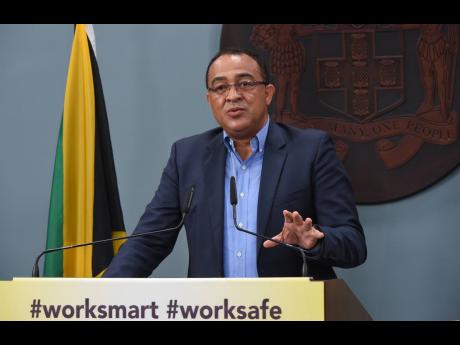COVID-19 poses voting dilemma
As the island grapples with holding a general election in the throes of a deadly pandemic, a leading constitutional lawyer has suggested that the Government may have to make special provisions for citizens suspected or confirmed of having COVID-19, as by law, their illness does not exclude them from exercising their democratic right next week.
“They (Government) have to show that they have taken every reasonable measure to facilitate the persons’ votes. If there is some alternative way of getting the persons’ votes, they would have to take that alternative,” Dr Lloyd Barnett told The Sunday Gleaner last Friday. “They can’t just say that once you are positive, you can’t vote.”
Even while underscoring that the COVID-19 crisis is frightening locally and internationally, Barnett said the State does not have the luxury of barring citizens from their democratic franchise.
“The obligation of the authorities is to do their best to provide reasonable means so that the person’s rights can be exercised. It is not possible for them to bar somebody from exercising their rights,” he continued, adding that the same would obtain for elderly voters, who have been ordered to remain at home due to their high risk of adverse effects should they contract COVID-19.
Up to Saturday, Jamaica had recorded 1,413 cases of COVID-19 since the deadly coronavirus was first detected in the island on March 10. The nation was notified of 331 of those cases between Sunday and Saturday. Sixteen persons have also lost their lives to the illness locally.
In a release yesterday, Public Defender Arlene Harrison Henry said that while the COVID-19 pandemic presented a challenging situation, “the sacrosanct right to vote in free and fair elections must be maintained and the laws of this country prevail”.
Noting that the current spike in COVID-19 cases in sections of the island is being linked to activities during the Emancipation and Independence holiday period earlier this month, Harrison Henry said a similar spike is being expected because of noticeable breaches of protocols during the campaign, including on nomination day.
She pointed out if certain communities have to be placed under quarantine, Section 20 of ROPA gives the governor general the power to delay polling in these areas by up to 30 days due to the “outbreak of infectious disease”.
Last week, Director of Elections Glasspole Brown told The Sunday Gleaner that there were ongoing meetings on voting within the COVID-19 context.
“There have been discussions taking place between the ECJ (Electoral Commission of Jamaica) and public health [officials], and those discussions have not yet been finalised,” he said on Wednesday, adding that while “voters have the right to cast their ballots, there are other aspects of it (the Representation of the People Act, ROPA) that can have an impact – things that give the public health authority certain rights”.
Brown explained that apart from individuals confirmed to be of certain mental illnesses, the ROPA does not prevent anyone from participating in elections based on health concerns.
He stressed, however, that the primary mandate of the Electoral Office of Jamaica was to ensure a smooth and safe election which upholds the laws of the country. Issues outside of those are beyond his control, he told our news team.
Brown’s position was in contrast to responses from Health & Wellness Minister Dr Christopher Tufton on the matter two days earlier.
In a radio interview, Tufton said COVID-19-positive persons would not be allowed to enter the polling stations as they would pose a risk to other voters.
“If they were to abandon the protocols around which persons with highly contagious diseases are housed, then clearly, in cases where they are very ill, it would be a risk to them, and in cases where they are asymptomatic, it would be a greater risk to others,” Tufton said.
“The public health position is very clear that persons who are positive should not be allowed to represent or to pose a risk to others on election day or at any other time,” the minister stressed, reiterating that COVID-19-positive persons should remain in isolation because of the contagious nature of the disease.
He explained, however, that persons with unconfirmed COVID-19 test results and those who have been placed in home quarantine would be allowed to vote.
“As of now (August 17), the position is that those persons should be allowed to vote; and there are about 28,000 Jamaicans currently who are in home quarantine. That’s a fairly significant number,” he said.
Tufton did not state how such individuals would be screened at the polling stations, and when contacted by The Sunday Gleaner for further comments, he said the public would soon be made aware of the Government’s final decision.
At least two candidates in the September 3 polls – the Jamaica Labour Party’s Robert Montague and Andrew Wheatley – were placed under home quarantine following news of a positive COVID-19 result for Port Maria Mayor Richard Creary. Montague said he has since tested negative for the virus and is no longer in quarantine.



